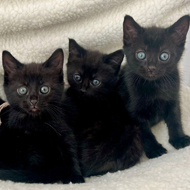
The animals continue to be overlooked in rescue centres.
Almost half of the cats in RSPCA’s care are black or black and white, and are often the last to be chosen for adoption, according to new figures.
Statistics published by the charity show that black and black and white cats made up 47 per cent of felines in their care in the last year alone.
A total of 1,096 black and 1,501 black-and-white cats arrived at their National Animal Centres. This is more than 10 times the number of white cats, and over five times more than ginger cats.
Despite their high numbers, black cats remain in the care of the RSPCA for 71 days, and black and white cats for 69 days, compared to 64 days for tabbies.
In light of these figures, the RSPCA is urging potential adopters to open their homes to a black cat as part of its month-long rehoming campaign, Adopter.
Furthermore, with Halloween also just around the corner, the charity is seeking to dispel the spooky superstitions surrounding black cats — from myths and legends, to tales of witchcraft.
Alice Potter, RSPCA cat welfare expert, said: “Black cats are still being overlooked in rescue centres, often due to outdated superstitions and the myth that they bring bad luck. Sadly, they’re also sometimes seen as less ‘photogenic’ for social media, which can affect adoption interest.
“But the truth is, black cats are just as affectionate, playful and full of personality as any other cat”.
Image (C) RSPCA.



 The Greyhound Board of Great Britain has published new vaccination guidance, with all greyhounds registered from 1 January, 2027 required to have the L4 leptospirosis vaccination, rather than L2.
The Greyhound Board of Great Britain has published new vaccination guidance, with all greyhounds registered from 1 January, 2027 required to have the L4 leptospirosis vaccination, rather than L2.